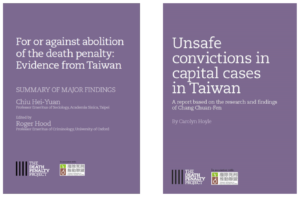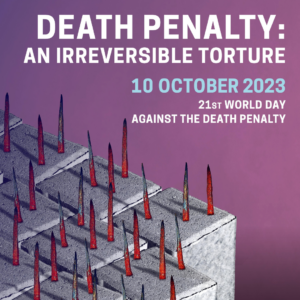
New reports on public opinion and unsafe convictions provide momentum for reform of capital punishment in Taiwan
- News
- 17 Mar 2019
The Death Penalty Project, in association with the Taiwan Alliance to End the Death Penalty (TAEDP), has today launched two new reports on the death penalty in Taiwan: a study of wrongful convictions in capital cases – Unsafe convictions in capital cases in Taiwan, and a study of public attitudes towards the death penalty – For or against abolition of the death penalty: Evidence from Taiwan.
These studies have been developed to inform debate on the death penalty in Taiwan and to confront the view that popular sentiment should dictate penal policy, especially when the majority of citizens may base their opinions on misinformation and misconceptions about the administration of the death penalty. Support for the death penalty rests upon a belief that the system is administered without error, and we should not underestimate the impact of knowledge that the death penalty can be inflicted on innocent or undeserving persons.
Unsafe convictions in capital cases in Taiwan reveals a number of serious flaws in the Taiwanese criminal justice system. Analysing data collected from all capital convictions recorded between 2006 and 2015, the findings highlight numerous practices that are likely to compromise the safety of the convictions which have resulted in the imposition of death sentences. Of great concern is that, of the 62 cases reviewed, ten judgments were found to be erroneous – with no significant inculpatory evidence to support the prosecution’s key claims. Almost half of the judgments (28) contained assertions about criminal intent without any supporting evidence to substantiate these claims. The evidence that the death penalty cannot be administered without error is not, however, unique to Taiwan, with miscarriages of justice occurring in every system.
International experience demonstrates that no criminal justice system is infallible, and this is evidenced by at least 55 death row prisoners being exonerated worldwide in 2017 alone. Wherever capital punishment exists, the risk that innocent people will be sentenced to death and executed is a grim reality. Until such time as the Taiwanese government takes steps to realise its commitment to abolish the death penalty, this report demonstrates the urgent need for Taiwan to adhere to the international human rights norms and procedural standards that safeguard people convicted of capital offences. This may in theory decrease the likelihood of wrongful convictions, but as this report demonstrates it will never eliminate it altogether. As the majority of the world’s nations have recognised, there is no perfect justice system, as error is inevitable, and the only solution is to abolish the death penalty altogether.
For or against abolition of the death penalty: Evidence from Taiwan:
Policy makers in Taiwan maintain that abolition of the death penalty is not feasible because of the strength of public opposition to it. This study challenges the assumption that it is necessary to retain the death penalty because public opinion reflects a high level of support, interest and concern about the issue. The research demonstrates that whilst a majority (85%) of respondents are opposed to abolition of the death penalty, only a minority (32%) were strongly opposed to abolition. Moreover, when respondents were informed of the case of Chiang Kuo-ching (江國慶), an innocent man executed in Taiwan in 1997, the number strongly opposed to abolition decreased even further to only 6%. The report concludes that public opinion, as a barrier to abolition, has been widely exaggerated in the context of policy reform discussions.
• Support for the death penalty was only low or moderate when considered in the context of different types of murder – and with mitigating factors taken into account. A majority of respondents considered the death penalty appropriate in only two of the five case scenarios that were presented. In one of the case scenarios, support dropped from 83% to just 34% when concerns were raised about the defendant’s poor mental health.
• On what knowledge are opinions based? Opinions are based on very poor understanding of the death penalty. Only 0.2% of respondents were able to answer four factual questions on the death penalty correctly. Efforts to increase public understanding of the death penalty, including the human rights violations that have plagued its implementation worldwide, would assist the government in achieving its aim of abolition.
• Government policies to improve crime control and prevention were preferred to reliance on sporadic executions. The majority (85%) of respondents supported the statement that ‘not only the criminals themselves, but also society and the government, should be held responsible for crimes’.
Professor Carolyn Hoyle, University of Oxford and author of the Unsafe Convictions report, said:
“By highlighting both the nuances in public opinion and the challenges faced by the Taiwanese justice system, it is hoped that these new reports – and the robust and critical information they provide – will assist the Taiwanese government to move steadfastly towards their stated aim of abolishing the death penalty in Taiwan.”
Saul Lehrfreund, Co-Executive Director of The Death Penalty Project, commented that:
“This research goes beyond the simple “for or against” questions upon which opinion polls are typically based and has uncovered important nuances to public opinion. The findings do not back the claim that support for retention of the death penalty is so strong that it is an insurmountable barrier to its abolition. To the contrary, public opinion is significantly less entrenched than it initially appears. Opinions in favour of retention of the death penalty are clearly dependent on the belief that the death penalty is administered fairly, without the possibility of error leading to the execution of the innocent. Taken together with the findings of the study on wrongful convictions in Taiwan, the inescapable reality is that the death penalty cannot be administered without error and the real risk that innocent people will be sentenced to death and executed. What is clear from these studies is that when political leadership is exercised, and when the human rights case for moving away from the death penalty is made, including an acceptance that there is no perfect justice system, the public is accepting of abolition notwithstanding general support for the death penalty in the abstract”.



Notes to Editors
Unsafe convictions in capital cases in Taiwan is written by Professor Carolyn Hoyle (University of Oxford) and based on the research and findings of Dr Chang Chuan-Fen (Taipei National University).
For or against abolition of the death penalty: Evidence from Taiwan is written by Professor Chiu Hei-Yuan (Academia Sinica) and edited by Professor Roger Hood (University of Oxford).
Both publications, produced in association with the Taiwan Alliance to End the Death Penalty, were made possible by a grant to The Death Penalty Project from the Magna Carta Fund of the UK Foreign and Commonwealth Office.
These reports are the third and fourth in The Death Penalty Project’s series of studies of capital punishment in Taiwan. Previous reports include The Death Penalty in Taiwan (2014), an examination of Taiwan’s legal obligations under the International Covenant on Civil and Political Rights, and Handbook of Forensic Psychiatric Practice for Capital Cases in Taiwan (2015).




















